 newsitems
newsitems  Bulgaria: People Vote + 51% Absolute Majority to the Right, only 40,8% to "Left"-Turkish groups
Bulgaria: People Vote + 51% Absolute Majority to the Right, only 40,8% to "Left"-Turkish groups
Bulgaria: People Vote + 51% Absolute Majority to the Right, only 40,8% to "Left"-Turkish groups
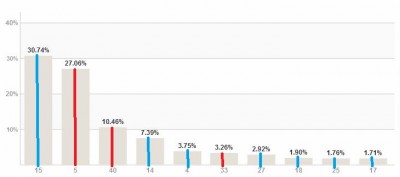
The Bulgarian People gave a crystal-clear preference to Center-Right parties in the crucial National Elections of this Sunday, which gather, all in all, a Total of Votes much Bigger than an Absolute Majority of some 51 % against only about 40,8 % to the "Left" side of the Political spectrum, where the former "Socialist" party is again obliged to deal with a smaller pro-Turkish grouplet, (while, on the contrary, at the Right side, in addition to the maintainance of traditional Rightist parties, apparently emerge even some New small but fast growing Movements).
After initially winning at the 2009 Elections, Borisov's GERB Party already won, at the end of 2011, also the Presidential Election with about 53% to 47% vis a vis the formerly governing "Socialist" party.
But, this time, the picture seems rather Complicated, and some last-minute "surprises" couldn't be excludedn even if they apparently should be of Minor nature, since the overall Popular preference for the Center-Right looks unquestionably much Stronger, (while the Participation reached a Majority of about + 51,5 % until 9 p.m.).
In particular :
Bulgarian Election: Center Right (GERB + Attaka) wins about 40% , while even a new Rightist Party (of "National Liberation") would reportedly be close to the threshhold allowing to enter the Parliament for the 1st time, against only 36,4% for the Socialo-Turkish parties of the outgoing opposition, which had previously governed the country for a long time, until it fell into the 2009 Economic Crisis and Corruption scandals.
GERB Party comes clearly First with more than 31 %, while "Socialists" have only 27 %/, with probably some 98 against 75 MPs each.
"Attaka"s Nationalists and the "Turkish" Minority party would result at about 7,5 % to 9,7 % or so, taking some 23 and 33 MPs respectively.
The New Rightist party NLB (which currently stands at about 3,8 %, i.e. close to the 4% threshhold) might hold a key to further developments, if its entry to the Parliament is confirmed, according to observers, while the "Left" apparently expects from last-minute .... "votes coming from Turkey" (sic !) to eventually alter this overall results...
As things stand until now, a possible formula might reportedly be for GERB (which means "Citizens for European Development") to form a Minoriyu Government with a deal for support by Attaka (and/or , eventually of the New Rightist Paty NLB) in the Parliament, (i.e. a kind of former "Dutch formula").
On the contrary, observers admit that it would be impossible for Attaka to stick to the Socialo-Turkish parties, mainly because it's notoriously Critic vis a vis Turkey's controversial policies.
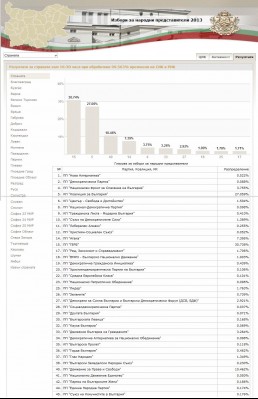
But another serious problem is also the Astonishing fact that more almost 25%, i.e. 1 out of 4 Votes casted risk to stay without any Representation in the Parliament, because until now the official results don't give more than 4% (the rather High Threshhold for getting elected MPs) to anyone among the numerous New or old Other Parties to which many Bulgarian Citizens have Dispersed their votes..
However, a Detailed and concrete Analysis of all currently available results, (reportedly representing some 99,6% of the Total of Votes), clearly reveals that Most of those Dispersed Votes point towards Center Right up to Rightist new or old small Parties, resulting in an overall overwhelming Popular aspiration to have a new kind of Government at the Right side of the Political spectrum :
Thus, f.ex. the GERB and Attak groups could logically attract also the New "National Salvation" party, as well as the "Bulgarian National movement", the "Leader" party, and the "Order, Law and Justice" party, resulting in more than the Absolute Majority of valid Votes casted : + 50,17 %
(i.e. : 31% + 7,5% + 3,8 % + 2,92% + 1,9% + 1,76% + 1,71% +...). In fact, such a Majority of the Center-Right seems to be even Bigger than that, considering also some + 2% of more Votes casted for the "ChristianDemocratic" party, "Strong" and/or "Proud Bulgaria" a.o. small Nationalist parties, etc.
At the "Left" side, the former "Socialist" Party is obviously obliged to stick again with the Turkish lobby, and could attract Ms Kouneva's small "Movement of Bulgarian Citizens" party which didn't get any MP, arriving at less than 41 % only, (i.e. 27,6% + 10% + 3,26 % = 40,86 %, ...etc).
Perhaps it might, eventually, be joined also by a few other, even smaller, non-represented parties, such as the "Greens", or "New Alternative", etc., which have hardly more than 1 % only.
The still remaining, Tiny, non-represented parties, who don't seem to have any clear political stance on the Left/Right Divide of the Political spectrum, (such as "Center", "Vox Populi", etc), don't represent but Negligeable variations of less than 2% or so, all in all, which obviously can't change the overall, general orientation, given the fact that the Total Difference between "Left" and "Right", as we already saw above, remains apparently more than + 10 % in favor of the Center-Right parties, led by Frontrunner GERB.
But, curiously, Final Results, (i.e. beyond the 99,6% already counted until today), are reportedly due for much Later this week, "on Thursday"...
---
(Sources : Central Electoral Commission of Bulgaria, National, Foreign and International Press Agencies, Wikipedia, etc).
-----
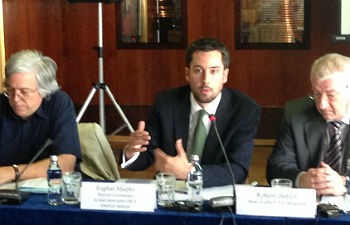
Meanwhile, COE/OSCE Official Conclusions on the way that the Bulgarian Elections were organzed in practice, clearly appear mainly Positive :
In an official CoE Statement published later Today in Strasbourg, the competent Delegation of the PanEuropean Organisation for Human Rights, Democracy and Rule of Law, send by its Parliamentary Assembly to observe facts on the spot in cooperation with OSCE, and headed during the Vote by experienced Swiss MEP Andreas Gross (President of the Socialist Group), gave a "Green" Light to Sunday's Bulgarian Elections' process, by stressing in conclusion that they were "Competitive and Well run".
- In particular, "fundamental Freedoms were respected, and the Administration of elections was well Managed". "The Campaign was Competitive and generally free of violence, and the caretaker government undertook several measures to hold Genuine elections". “Voters had a genuine Choice ....and the (Bulgarian) Authorities made real steps to uphold the Integrity of the election", so that "we have seen here ... Genuine efforts at holding democratic elections".
- The process was Well-administered by the Central Election Commission (CEC), which generally worked in an Open manner", while "the posting of CEC sessions on the Internet was a Welcome Transparency measure" In addition, the "Election day took place in a Calm and orderly manner, with polling station Openings and Voting mostly assessed Positively... Tabulation, overall, was positive. The large Number of proxies and Observers present enhanced Transparency".
- Earlier, "the Media landscape during the campaign was Pluralistic", while "Public broadcasters and some private media granted contestants Free airtime on popular election-related programmes".
Finally, "the Legal framework for the elections generally provides a Sound basis ....when implemented properly", and several "Rrecommendations made by the OSCE... and the CoE were Adopted in recent amendments to the Electoral Code", they noted.
---------------------------------------------
- However, several People's "Trust in process is lacking", CoE/OSCE Observers noted among some Critical Remarks on particular points :
F.ex., "pervasive Allegations of vote-buying" "affected Negatively the campaign environment", while, earlier, it "was overshadowed by a number of Incidents" :
Thus, "public Confidence in the process" was "weakened" by "Cases of Pre-election wiretapping and Concerns over last-minute incidents related to ballot security". While "the campaign was, at times, negative, with some parties using Inflammatory and xenophobic rhetoric", observers found.
- "Eoghan Murphy, the Special Co-ordinator who led the Short-term OSCE observer mission", reportedly said that "scandals (?) and the recent discovery of additional ballot papers without proper explanation, Undermined people’s Faith in the political system and, more worryingly, made Them Question the process itself". “When you look at the misTrust that exists between political parties, and at the current economic difficulties, this is a negative development.”
- Precisely, “All those who have been Elected have to address" the fact that “Lack of public Confidence in the electoral process, and the alienation of too many Bulgarians from their public institutions; remains a matter of concern,” said Andreas Gross, the head of the delegation from CoE's Assembly, (which appeared, generally, rather more satisfied than OSCE, but pointed at the need "to overcome the social and political crisis with which the Bulgarian people are confronted").
F. ex., to "improve Transparency", the CEC should be "providing more Information on the times of all of its Sessions, and the Basis for its Decisions", using also ""Legal provisions on campaign Financing", while "there were some concerns expressed about the independence of Lower election commissions", since "the Counting of ballots was more Problematic in a number of cases", observers noted.
Meanwhile, "Media ownership lacks transparency" : F.ex. "a significant share of the campaign information had to be Paid for, creating a playing field for candidates that was Not level and Limiting the public media’s role in providing voters with a broad range of information. Paid campaign information was not always clearly labelled as such, potentially Misleading voters about the sources of election-related messages".
So that, "in order to restore the Trust of Bulgarian citizens, ... the cycle of Impunity must be broken" on some "serious violations during this campaign", which "have to be thoroughly Investigated and those responsible prosecuted,” reportedly added Miklós Haraszti, the Head of the OSCE/ODIHR Long-term election observation mission.
=> In conclusion, the Head of the OSCE Parliamentary Assembly delegation, Roberto Battelli, reminded, as a matter of General Principle, that : - "In many Countries we see systematic attacks on the credibility of the democratic institution of elections", while, in fact, "it is only through Democratic institutions that social, Economic and Political Changes can be addressed effectively
***
(NDLR : "DraftNews", as already sent, earlier, to "EuroFora"s Subscribers/Donors. A more accurate, full Final Version might be published asap).
***
Main Menu
Home Press Deontology/Ethics 2009 Innovation Year EU endorses EuroFora's idea Multi-Lingual FORUM Subscribers/Donors FAQs Advanced search EuroFora supports Seabird newsitems In Brief European Headquarters' MAPs CoE Journalists Protection PlatformBRIEF NEWS
- 00:00 - 02.06.2021
- 00:00 - 18.10.2020
- 00:00 - 19.06.2020
- 00:00 - 18.05.2020
- 00:00 - 20.04.2020
- 00:00 - 02.02.2020
- 00:00 - 09.12.2019
- 00:00 - 27.11.2019
- 00:00 - 16.11.2019
Popular
- Yes, we could have prevented Ferguson riots says World Democracy Forum's Young American NGO to ERFRA
- Spanish People Elect CenterRIGHT Majority with 1st Party and Total of 178 MPs (6 More than the Left)
- Pflimlin's vision
- The European Athletic "Dream Team", after Barcelona 2010 Sport Championship Results
- Source Conseil d'Europe à ERFRA: Debatre Liberté d'Opposants à Loi livrant Mariage+Enfants à Homos ?
- Head of BioEthics InterGroup, MEP Peter Liese : "Embryonic stem cell research reaching its END" !?
- Spain: Jailed Turkish Terror suspect with Explosive,Drones,Chechen accomplices stirs Merah+ Burgas ?
- UN Head Ban Ki Moon at CoE World Democracy Forum : - "Listen to the People !"
Latest News
- Test Photos (f.ex.+ Invit to EU + Korea Peace meeting)
- EUOmbudsmen Conference 2022: Digital Gaps affect People's Trust threaten EF Project on EU Future ?
- French Election : Black Out on Virus, but Obligation for Fake 'Vaccines" Challenged
- Both French Presidential Candidates point at "Humanism" in crucial times...
- France : Zemmour = Outsider may become Game Changer in Presidential + Parliamentary Elections 2022
Statistics
Visitors: 61934396Archive
Login Form
Other Menu
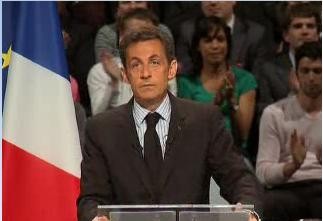
EU Rapporteur on Enlargment Strategy, maistream German MEP Elmar Brok, speaking to "EuroFora", welcomed the proposal made earlier this week by French President Nicolas Sarkozy for the EU to"start Now Talks with Turkey to create a common Economic and Security area", instead of full Accession, at a period when Ankara looks more and more unfit and/or unwilling to respect EU conditions.
- "For Europe to have strong Political will, it must stop dilutiing itself in an endless Enlargement. It must have borders...Diversities enrich, on the condition that they don't undermine European Cohesion, and don't weaken EU Unity", Sarkozy stressed.
- "Countries like Turkey share a part of common destiny with Europe, with which they have a vocation to build a Privileged Relation, to be closely associated, but not to become Member of the EU" : "Noone respects his friends by telling them lies. Noone respects his friends by making them promises that will be never kept", he added.
That's why "we'd better start, from now, negotiating with Turkey to create a common Economic and Security area", Sarkozy proposed.
Significantly, the French President was repeatedly and largely applauded by EU citizens, 3 times, when he made the Turkey point, (strategically placed between Europe's "Political Will" and its cultural heritage, historically open to mutually enriching dialogue with all the World, but never diluted).
- "We could propose such a great ambition also to Russia, which must not be percieved as an Adversary of Europe, but as a Partner. Thus, we'd create a wide area, of more than 800 Million inhabitants, sharing the same Security, the same Prosperity", he concluded.

Sarkozy's move was anounced at the eve of a Franco-German Top meeting with Chancellor Angie Merkel in Berlin on Sunday, to jointly launch the EU Elections campain, after an EU Summit at nearby Prague, to launch a new kind of relations, called "Eastern Partnership", with neighboring countries such as Urkaine, Belarus, Moldova, Georgia, Armenia, Azerbaidjan, etc, (to which Russia, reportedly, is not - and does not want to be - included).
As for Ukraine, which has already expressed her wish to join the EU in future, "Kiev will have a special place, and a very important role to play", replied earlier this week in Strasbourg, to an "EuroFora" question EU Chairman in office , Czech vice-Prime Minister Alexander Vodra.
- "This direction is more Realistic for Turkey than Accession negotiations", reacted immediately EU Parliament's Rapporteur for Enlargment Strategy, mainstream German MEP Elmar Brok, commenting Sarkozy's idea for "EuroFora"
Particularly "as far as it concerns the respect of EU Rules by both sides", he added, hinting at Turkey's now obvious inability and/or unwillingness to abide with EU Acquis, EU Commitments (fex. on Cyprus, etc), and European Democracy/Human Rights rules. (Comp. infra).
Brok added that, in his view, a similar proposal might be made also to Ukraine and other neighbouring Countries, regardless if they have, or not, a "European vocation". This would not necessarily mean that there couldn't be any accession prospects at all." for all the countries that might be included in this area, according to Brok. But it's preferable, particularly for Turkey, "because it's a more Realistic approach than full Membership".
On this point, Sarkozy's proposal, (which he'll share with German Chancellor Merkel), seems more crystal-clear.
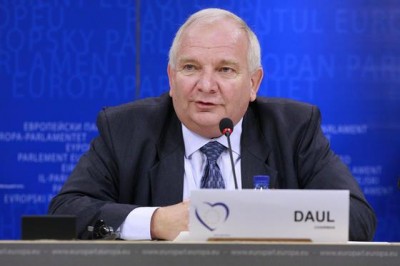
- "Turkey does not fullfil EU Criteria, and will never fullfil EU Criteria" on Human Rights, Democracy and Rule of Law. "Some have been lying to Ankara, but we must tell the Truth, and have honest and close relations with her", said meanwhile to "EuroFora" on the same issue also the President of EU Parliament's largest Group of MEPs (ChristianDemocrats/EPP), Joseph Daul.
------------------------------
"Hot" Debate at EU Parliament reveals CHANGE of mood towards "Suspension" of EU - Tukey talks.
------------------------------
Earlier this week, many MEPs, and even some of those who were previously in favor of Turkey's controversial EU bid, strongly criticized the persistance and even aggravation of serious Human Rights violations in the country, that ECHR continues to "unanimously" condemn ":
- "After winning a big victory in the latest Local Elections, the pro-Kurdish party DTP almost doubled its Elected Mayors from 52 to 98", but afterwards "more than 400 politicians were thrown to Prison and prosecuted" by the Turkish Authorities, denounced on behalf of the ChristianDemocrat/EPP Group, Belgian MEP Frieda Brepoels.
At the same time, "more than 1.500 Children are closed in Turkish Prisons", she added. "What will the EU Commission do" against these facts ?
- "Turkey appears to be at greater Distance away from Copenhagen Criteria after 4 Years of accession Negotiations, than when they started !", denounced on behalf of the Liberal Group, German MEP Alexander Lambsdorf.
"On the central issue of Press Freedom, Critical Journalists face obstacles for their accreditation, others are prosecuted, condemned, fined and/or jailed, Media blocked or closed", he denounced.
- "EU Made 2 grave Mistakes with Turkey : To start accession negotiations, and to continue them", despite everything, criticized Dutch MEP Bastian Belder, on behalf of the Ind/Dem group.


















